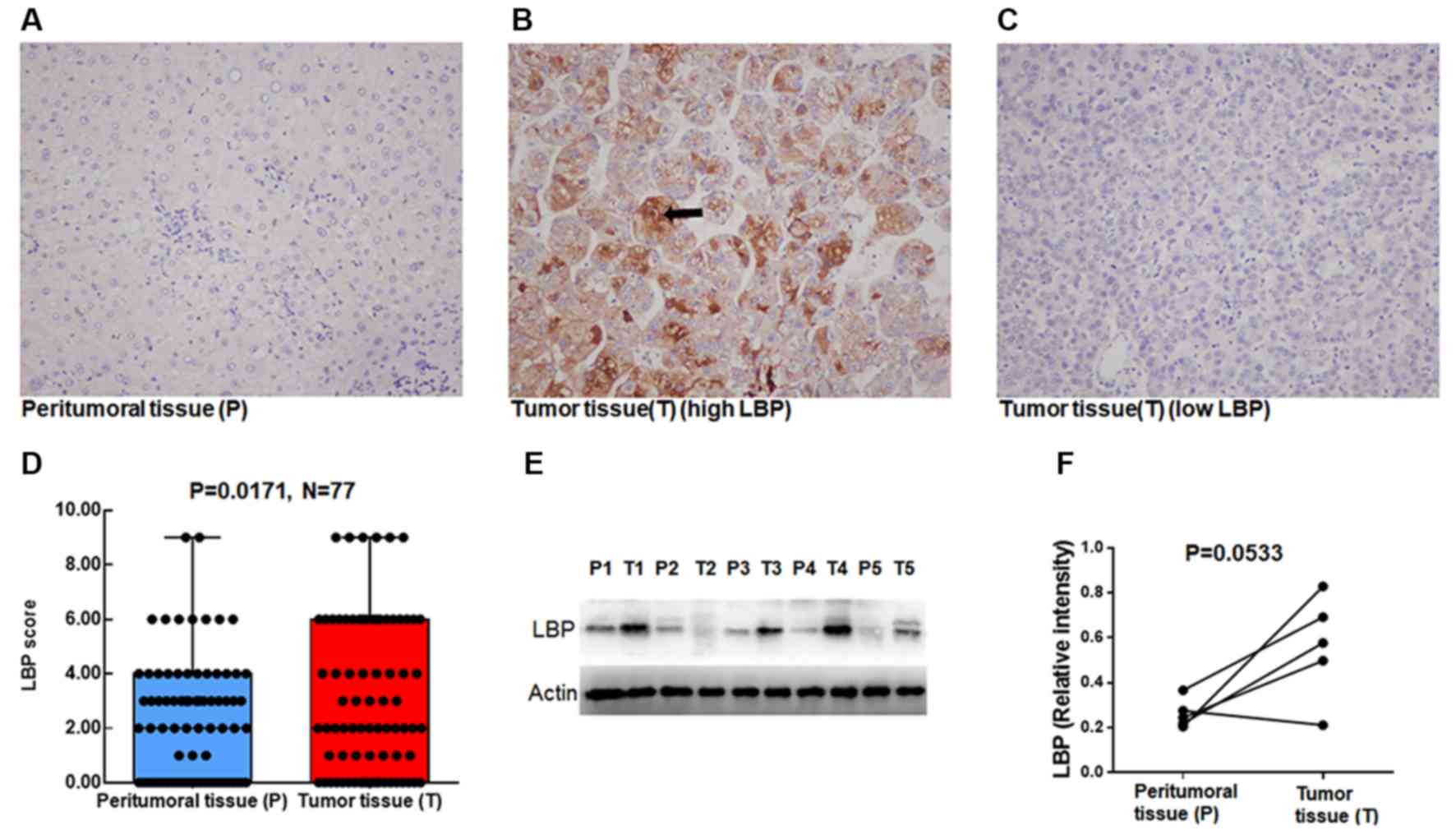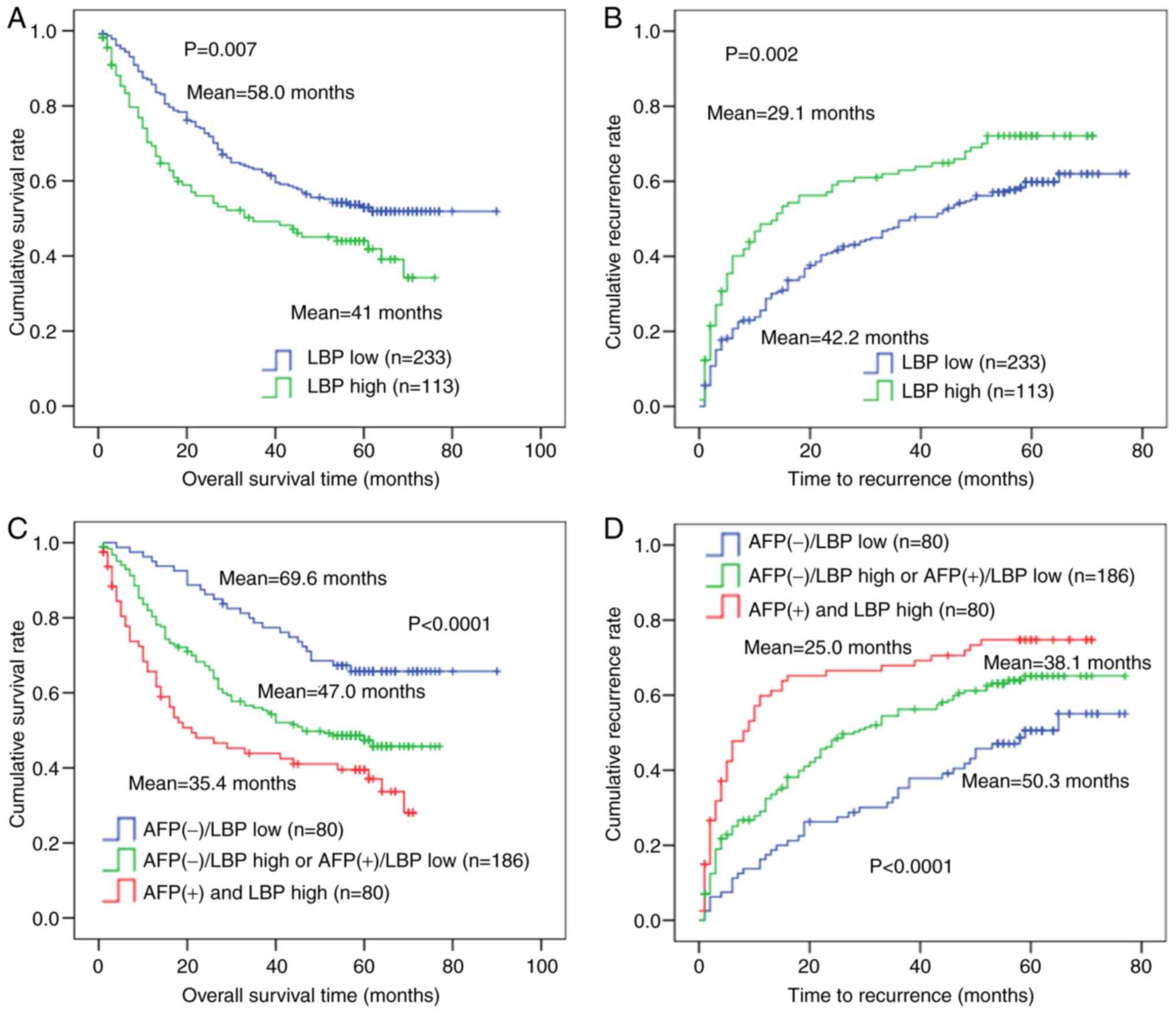|
1
|
Khemlina G, Ikeda S and Kurzrock R: The
biology of Hepatocellular carcinoma: Implications for genomic and
immune therapies. Mol Cancer. 16:1492017. View Article : Google Scholar : PubMed/NCBI
|
|
2
|
Chen W, Zheng R, Baade PD, Zhang S, Zeng
H, Bray F, Jemal A, Yu XQ and He J: Cancer statistics in China,
2015. CA cancer J Clin. 66:115–132. 2016. View Article : Google Scholar : PubMed/NCBI
|
|
3
|
Tang A, Hallouch O, Chernyak V, Kamaya A
and Sirlin CB: Epidemiology of hepatocellular carcinoma: Target
population for surveillance and diagnosis. Abdom Radiol (NY).
43:13–25. 2018. View Article : Google Scholar : PubMed/NCBI
|
|
4
|
Ziogas DE, Kyrochristos ID, Glantzounis
GK, Christodoulou D, Felekouras E and Roukos DH: Primary liver
cancer genome sequencing: Translational implications and
challenges. Expert Rev Gastroenterol Hepatol. 11:875–883.
2017.PubMed/NCBI
|
|
5
|
Shin J, Yu JH, Jin YJ, Suh YJ, Kim DH,
Byun S and Lee JW: Effective therapeutic options for elderly
patients with hepatocellular carcinoma: A nationwide cohort study.
Medicine (Baltimore). 98:e161502019. View Article : Google Scholar : PubMed/NCBI
|
|
6
|
Lai EC, Lo CM, Fan ST, Liu CL and Wong J:
Postoperative adjuvant chemotherapy after curative resection of
hepatocellular carcinoma: A randomized controlled trial. Arch Surg.
133:183–188. 1998. View Article : Google Scholar : PubMed/NCBI
|
|
7
|
Tung-Ping Poon R, Fan ST and Wong J: Risk
factors, prevention, and management of postoperative recurrence
after resection of hepatocellular carcinoma. Ann Surg. 232:10–24.
2000. View Article : Google Scholar : PubMed/NCBI
|
|
8
|
Xia Y, Qiu Y, Li J, Wang K, Xi T, Shen F,
Yan Z and Wu M: Adjuvant therapy with capecitabine postpones
recurrence of hepatocellular carcinoma after curative resection: A
randomized controlled trial. Ann Surg Oncol. 17:3137–3144. 2010.
View Article : Google Scholar : PubMed/NCBI
|
|
9
|
Bai DS, Dai Z, Zhou J, Liu YK, Qiu SJ, Tan
CJ, Shi YH, Huang C, Wang Z, He YF and Fan J: Capn4 overexpression
underlies tumor invasion and metastasis after liver transplantation
for hepatocellular carcinoma. Hepatology. 49:460–470. 2009.
View Article : Google Scholar : PubMed/NCBI
|
|
10
|
Xu YF, Yi Y, Qiu SJ, Gao Q, Li YW, Dai CX,
Cai MY, Ju MJ, Zhou J, Zhang BH and Fan J: PEBP1 downregulation is
associated to poor prognosis in HCC related to hepatitis B
infection. J Hepatol. 53:872–879. 2010. View Article : Google Scholar : PubMed/NCBI
|
|
11
|
Yang XR, Xu Y, Yu B, Zhou J, Li JC, Qiu
SJ, Shi YH, Wang XY, Dai Z, Shi GM, et al: CD24 is a novel
predictor for poor prognosis of hepatocellular carcinoma after
surgery. Clin Cancer Res. 15:5518–5527. 2009. View Article : Google Scholar : PubMed/NCBI
|
|
12
|
Cai MY, Tong ZT, Zheng F, Liao YJ, Wang Y,
Rao HL, Chen YC, Wu QL, Liu YH, Guan XY, et al: EZH2 protein: A
promising immunomarker for the detection of hepatocellular
carcinomas in liver needle biopsies. Gut. 60:967–976. 2011.
View Article : Google Scholar : PubMed/NCBI
|
|
13
|
Llovet JM, Bru C and Bruix J: Prognosis of
hepatocellular carcinoma: The BCLC staging classification. Semin
Liver Dis. 19:329–338. 1999. View Article : Google Scholar : PubMed/NCBI
|
|
14
|
Schumann RR, Kirschning CJ, Unbehaun A,
Aberle HP, Knope HP, Lamping N, Ulevitch RJ and Herrmann F: The
lipopolysaccharide-binding protein is a secretory class 1
acute-phase protein whose gene is transcriptionally activated by
APRF/STAT/3 and other cytokine-inducible nuclear proteins. Mol Cell
Biol. 16:3490–3503. 1996. View Article : Google Scholar : PubMed/NCBI
|
|
15
|
Schumann RR, Leong SR, Flaggs GW, Gray PW,
Wright SD, Mathison JC, Tobias PS and Ulevitch RJ: Structure and
function of lipopolysaccharide binding protein. Science.
249:1429–1431. 1990. View Article : Google Scholar : PubMed/NCBI
|
|
16
|
Yu LX, Yan HX, Liu Q, Yang W, Wu HP, Dong
W, Tang L, Lin Y, He YQ, Zou SS, et al: Endotoxin accumulation
prevents carcinogen-induced apoptosis and promotes liver
tumorigenesis in rodents. Hepatology. 52:1322–1333. 2010.
View Article : Google Scholar : PubMed/NCBI
|
|
17
|
Dapito DH, Mencin A, Gwak GY, Pradere JP,
Jang MK, Mederacke I, Caviglia JM, Khiabanian H, Adeyemi A,
Bataller R, et al: Promotion of hepatocellular carcinoma by the
intestinal microbiota and TLR4. Cancer Cell. 21:504–516. 2012.
View Article : Google Scholar : PubMed/NCBI
|
|
18
|
Darnaud M, Faivre J and Moniaux N:
Targeting gut flora to prevent progression of hepatocellular
carcinoma. J Hepatol. 58:385–387. 2013. View Article : Google Scholar : PubMed/NCBI
|
|
19
|
Zhang HL, Yu LX, Yang W, Tang L, Lin Y, Wu
H, Zhai B, Tan YX, Shan L, Liu Q, et al: Profound impact of gut
homeostasis on chemically-induced pro-tumorigenic inflammation and
hepatocarcinogenesis in rats. J Hepatol. 57:803–812. 2012.
View Article : Google Scholar : PubMed/NCBI
|
|
20
|
Malhotra R and Bird MI: L-selectin: A
novel receptor for lipopolysaccharide and its potential role in
bacterial sepsis. Bioessays. 19:919–923. 1997. View Article : Google Scholar : PubMed/NCBI
|
|
21
|
Garcia de Guadiana-Romualdo L,
Espanol-Morales I, Cerezuela-Fuentes P, Consuegra-Sánchez L,
Hernando-Holgado A, Esteban-Torrella P, Jiménez-Santos E,
Viqueira-González M, de Béjar-Almira Á and Albaladejo-Otón MD:
Value of lipopolysaccharide binding protein as diagnostic marker of
infection in adult cancer patients with febrile neutropenia:
Comparison with C-reactive protein, procalcitonin, and interleukin
6. Support Care Cancer. 23:2175–2182. 2015. View Article : Google Scholar : PubMed/NCBI
|
|
22
|
Chen R, Luo FK, Wang YL, Tang JL and Liu
YS: LBP and CD14 polymorphisms correlate with increased colorectal
carcinoma risk in Han Chinese. World J Gastroenterol. 17:2326–2331.
2011. View Article : Google Scholar : PubMed/NCBI
|
|
23
|
Kovacs G, Peterfi L, Farkas N, Javorhazy
A, Pusztai C and Szanto A: Expression of inflammatory
lipopolysaccharide binding protein (LBP) predicts the progression
of conventional renal cell carcinoma-a short report. Cell Oncol
(Dordr). 40:651–656. 2017. View Article : Google Scholar : PubMed/NCBI
|
|
24
|
Bosman FT, Carneiro F, Hruban RH and
Theise ND: WHO Classification of tumours of the digestive system.
Lyon: IARC Press; 3. pp. 205–216. 2010
|
|
25
|
Jin GZ, Yu WL, Dong H, Zhou WP, Gu YJ, Yu
H, Yu H, Lu XY, Xian ZH, Liu YK, et al: SUOX is a promising
diagnostic and prognostic biomarker for hepatocellular carcinoma. J
Hepatol. 59:510–517. 2013. View Article : Google Scholar : PubMed/NCBI
|
|
26
|
International Consensus Group for
Hepatocellular NeoplasiaThe International Consensus Group for
Hepatocellular Neoplasia, . Pathologic diagnosis of early
hepatocellular carcinoma: A report of the international consensus
group for hepatocellular neoplasia. Hepatology. 49:658–664. 2009.
View Article : Google Scholar : PubMed/NCBI
|
|
27
|
Yang GH, Fan J, Xu Y, Qiu SJ, Yang XR, Shi
GM, Wu B, Dai Z, Liu YK, Tang ZY and Zhou J: Osteopontin combined
with CD44, a novel prognostic biomarker for patients with
hepatocellular carcinoma undergoing curative resection. Oncologist.
13:1155–1165. 2008. View Article : Google Scholar : PubMed/NCBI
|
|
28
|
Tan N, Liu Q, Liu X, Gong Z, Zeng Y, Pan
G, Xu Q and He S: Low expression of B-cell-associated protein 31 in
human primary hepatocellular carcinoma correlates with poor
prognosis. Histopathology. 68:221–229. 2016. View Article : Google Scholar : PubMed/NCBI
|
|
29
|
Jin H, Wang C, Jin G, Ruan H, Gu D, Wei L,
Wang H, Wang N, Arunachalam E, Zhang Y, et al: Regulator of
calcineurin 1 gene isoform 4, down-regulated in hepatocellular
carcinoma, prevents proliferation, migration, and invasive activity
of cancer cells and metastasis of orthotopic tumors by inhibiting
nuclear translocation of NFAT1. Gastroenterology. 153:799–811.e733.
2017. View Article : Google Scholar : PubMed/NCBI
|
|
30
|
Jin GZ, Li Y, Cong WM, Yu H, Dong H, Shu
H, Liu XH, Yan GQ, Zhang L, Zhang Y, et al: iTRAQ-2DLC-ESI-MS/MS
based identification of a new set of immunohistochemical biomarkers
for classification of dysplastic nodules and small hepatocellular
carcinoma. J Proteome Res. 10:3418–3428. 2011. View Article : Google Scholar : PubMed/NCBI
|
|
31
|
Camp RL, Dolled-Filhart M and Rimm DL:
X-tile: A new bio-informatics tool for biomarker assessment and
outcome-based cut-point optimization. Clin Cancer Res.
10:7252–7259. 2004. View Article : Google Scholar : PubMed/NCBI
|
|
32
|
Kudo M: Multistep human
hepatocarcinogenesis: Correlation of imaging with pathology. J
Gastroenterol. 44 (Suppl):(19): S112–S118. 2009. View Article : Google Scholar
|
|
33
|
Ertle JM, Heider D, Wichert M, Keller B,
Kueper R, Hilgard P, Gerken G and Schlaak JF: A combination of
α-fetoprotein and des-gamma-carboxy prothrombin is superior in
detection of hepatocellular carcinoma. Digestion. 87:121–131. 2013.
View Article : Google Scholar : PubMed/NCBI
|
|
34
|
Morimoto M, Numata K, Nozaki A, Kondo M,
Moriya S, Taguri M, Morita S, Konno M, Sugo A, Miyajima E, et al:
Novel Lens culinaris agglutinin-reactive fraction of α-fetoprotein:
A biomarker of hepatocellular carcinoma recurrence in patients with
low alpha-fetoprotein concentrations. Int J Clin Oncol. 17:373–379.
2012. View Article : Google Scholar : PubMed/NCBI
|
|
35
|
Yamamoto K, Imamura H, Matsuyama Y,
Hasegawa K, Beck Y, Sugawara Y, Makuuchi M and Kokudo N:
Significance of alpha-fetoprotein and des-gamma-carboxy prothrombin
in patients with hepatocellular carcinoma undergoing hepatectomy.
Ann Surg Oncol. 16:2795–2804. 2009. View Article : Google Scholar : PubMed/NCBI
|
|
36
|
Marrero JA, Romano PR, Nikolaeva O, Steel
L, Mehta A, Fimmel CJ, Comunale MA, D'Amelio A, Lok AS and Block
TM: GP73, a resident Golgi glycoprotein, is a novel serum marker
for hepatocellular carcinoma. J Hepatol. 43:1007–1012. 2005.
View Article : Google Scholar : PubMed/NCBI
|
|
37
|
Fujiyama S, Morishita T, Sagara K, Sato T,
Motohara K and Matsuda I: Clinical evaluation of plasma abnormal
prothrombin (PIVKA-II) in patients with hepatocellular carcinoma.
Hepatogastroenterology. 33:201–205. 1986.PubMed/NCBI
|
|
38
|
Chon YE, Choi GH, Lee MH, Kim SU, Kim DY,
Ahn SH, Kim KS, Choi JS, Han KH, Chon CY and Park JY: Combined
measurement of preoperative alpha-fetoprotein and des-gamma-carboxy
prothrombin predicts recurrence after curative resection in
patients with hepatitis-B-related hepatocellular carcinoma. Int J
Cancer. 131:2332–2341. 2012. View Article : Google Scholar : PubMed/NCBI
|
|
39
|
Kang SH, Kim DY, Jeon SM, Ahn SH, Park JY,
Kim SU, Kim JK, Lee KS, Chon CY and Han KH: Clinical
characteristics and prognosis of hepatocellular carcinoma with
different sets of serum AFP and PIVKA-II levels. Eur J
Gastroenterol Hepatol. 24:849–856. 2012. View Article : Google Scholar : PubMed/NCBI
|
|
40
|
Lin Z, Xu SH, Wang HQ, Cai YJ, Ying L,
Song M, Wang YQ, Du SJ, Shi KQ and Zhou MT: Prognostic value of DNA
repair based stratification of hepatocellular carcinoma. Sci Rep.
6:259992016. View Article : Google Scholar : PubMed/NCBI
|
|
41
|
Hwang HW, Ha SY, Bang H and Park CK: ATAD2
as a poor prognostic marker for hepatocellular carcinoma after
curative resection. Cancer Res Treat. 47:853–861. 2015. View Article : Google Scholar : PubMed/NCBI
|
|
42
|
Boylan KL, Andersen JD, Anderson LB,
Higgins L and Skubitz AP: Quantitative proteomic analysis by
iTRAQ(R) for the identification of candidate biomarkers in ovarian
cancer serum. Proteome Sci. 8:312010. View Article : Google Scholar : PubMed/NCBI
|
|
43
|
Kimura Y, Yanagimachi M, Ino Y, Aketagawa
M, Matsuo M, Okayama A, Shimizu H, Oba K, Morioka I, Imagawa T, et
al: Identification of candidate diagnostic serum biomarkers for
Kawasaki disease using proteomic analysis. Sci Rep. 7:437322017.
View Article : Google Scholar : PubMed/NCBI
|
|
44
|
Wen W, Li Y, Cheng Y, He J, Jia R, Li C,
Guo J, Sun X and Li Z: Lipopolysaccharide-binding protein is a
sensitive disease activity biomarker for rheumatoid arthritis. Clin
Exp Rheumatol. 36:233–240. 2018.PubMed/NCBI
|

















